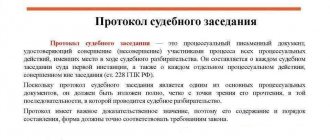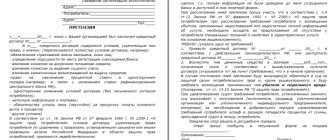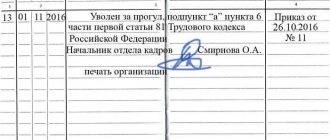New edition of Art. 157 Code of Civil Procedure of the Russian Federation
1. When considering a case, the court is obliged to directly examine the evidence in the case: listen to explanations of the parties and third parties, testimony of witnesses, expert opinions, consultations and explanations of specialists, read written evidence, examine material evidence, listen to audio recordings and watch video recordings.
2. The hearing of the case takes place orally and with the same composition of judges. If one of the judges is replaced during the consideration of a case, the proceedings must be carried out from the very beginning.
3. During a break announced in a court hearing on a pending case, the court has the right to consider other civil, criminal, administrative cases, as well as cases of administrative offenses.
After the end of the break, the court session continues, as announced by the presiding judge. Evidence examined before the break will not be reconsidered.
Article 157. Immediacy and orality of judicial proceedings
The only exception was the examination of eyewitness testimony.
If the parties, after the adjournment of the trial, did not insist on repeating the explanations of all participants in the process, were familiar with the case materials, including the explanations of the participants in the process given earlier, and the composition of the court did not change, the court had the right in accordance with the previously valid version of Part of the Code of Civil Procedure provide participants in the process with the opportunity to confirm previously given explanations without repeating them, supplement them, and ask additional questions.
In the article, the author examines the issues of replacing judges in civil proceedings. The absence in civil procedural legislation of an exhaustive list of grounds for replacing judges during the consideration and resolution of a civil case is noted as a shortcoming that requires regulatory regulation.
Key words: civil process, replacement of a judge, valid reasons, procedural document.
The constancy of the composition of the court is one of the ways to ensure that the court directly examines the evidence in the case, the most important procedural guarantee of a competent assessment of evidence and a fair resolution of the court case. The Civil Procedure Code of the Russian Federation1 (hereinafter referred to as the Code of Civil Procedure of the Russian Federation) contains a provision according to which the hearing of the case takes place orally and with composition of judges.
If one of the judges is replaced during the consideration of the case, the proceedings must be carried out from the very beginning. The Code of Civil Procedure of the Russian Federation does not contain grounds on which the composition of the court can be changed that are not related to the challenge, self-recusal of the judge or the termination or suspension of his powers, and therefore, on in our opinion, in fact, it allows for arbitrary replacement of the composition of the court. It should be noted that in the arbitration process a similar issue is regulated by the norms of the Arbitration Procedural Code of the Russian Federation2 (hereinafter referred to as the Arbitration Procedure Code of the Russian Federation). Thus, in Part 2 of Article 18 of the Arbitration Procedure Code of the Russian Federation, a case, the consideration of which was started by one judge or panel of the court, must be considered by the same judge or panel of the court. The Arbitration Procedure Code of the Russian Federation allows for the replacement of the composition of the court, not
associated with the challenge or self-recusal of a judge or one of the judges or the termination or suspension of their powers, only in the case of a long absence of the judge due to illness, vacation, study, or being on a business trip (Clause 2, Part 3, Article 18). The replacement of the composition of the arbitration court in these cases is caused by the objective impossibility (due to the temporary absence of a judge) or practical inexpediency (due to a long delay in resolving the dispute) of consideration of the case by the original composition of the court. Analyzing the practice of courts of general jurisdiction, several problematic issues can be identified.
Firstly, in the practice of courts, replacement of the composition of the court often occurs without the execution of any procedural document by an authorized official (chairman, deputy chairman of the court, chairman of the judicial panel) and without placing it in the case materials. Thus, the Perm Regional Court in its ruling indicated that the absence in the case materials of a procedural document on replacing the composition of the court does not indicate the illegality of the composition of the court that made the decision, and therefore does not affect the legality of the decision itself.
It should be noted that any change in the composition of the court that is not documented must be declared illegal. The replacement of a judge must take the appropriate procedural form, which may be the issuance of a reasoned order or ruling by the chairman of the court or his deputy, and this document must be attached to the case materials. The absence of such a document violates the parties’ right to a fair trial, as a result of which the judicial acts adopted by this court on the merits of the dispute must be declared illegal and subject to unconditional cancellation in a higher authority.
In our opinion, this issue was resolved absolutely correctly in the arbitration process. Thus, according to the practice of arbitration courts, the absence of documents on the replacement of a judge in the case file is an independent, unconditional basis for the annulment of adopted judicial acts, regardless of whether it was actually impossible for the original court to consider the case. Secondly, in practice, quite often the courts they change the composition of the court without justifying any valid reasons.
Courts check the legality and validity of court decisions or only their legality; in most cases, they do not analyze the validity of the reasons for replacing the composition of the court and the possibility of considering the case by the original composition of the court, pointing out only that the norms of civil procedural legislation do not define a detailed list of grounds for which a judge can be replaced. The absence in civil procedural legislation of a regulation of the procedure for resolving the issue of replacing a judge, as indicated by some courts of general jurisdiction, should not relieve the court from the obligation to indicate specific valid reasons that served as the basis for replacing the composition of the court considering the case with the attachment of the relevant procedural documents.
In this case, it is necessary to be guided by Part 4 of Article 1 of the Code of Civil Procedure of the Russian Federation, according to which, in the absence of a norm of procedural law regulating relations arising in the course of civil proceedings, federal courts of general jurisdiction and magistrates apply the norm regulating similar relations (analogy of law), and in the absence of such a norm, they act on the basis of the principles of administration of justice in the Russian Federation (analogy of law). Based on this, one should be guided by Part 2 of Article 18 of the Arbitration Procedure Code of the Russian Federation. The absence in a procedural document of reasons explaining the replacement of the court composition should be considered a violation of procedural law, as a result of which such a document should be declared illegal.
It is absolutely correct that the practice of arbitration courts has developed, according to which, when the composition of the court is replaced, when there was no opportunity for the case to be considered by the original composition of the court, the case is considered to be considered by an illegal composition, unless the court substantiates the reasons for the replacement.
Thirdly, the question remains unresolved: at what point to begin consideration of the case after the replacement of the judge and what is generally understood by judicial proceedings in relation to the principle of immutability of the composition of the court. In practice, the courts have developed a position according to which, consideration of the case from the very beginning after the replacement of the composition court, regardless of the grounds for such a replacement, indicates the legality of the composition of the court and the court decisions adopted by it. In this regard, the consideration of the case after replacing the composition of the court first becomes the only fact that is verified by a higher court to conclude that the legality of such a replacement has been observed.
In very few cases, after a change in the composition of the court, a preliminary court hearing is held9. In the overwhelming majority of cases, the courts do not hold preliminary court hearings in such situations, since they believe that after the composition is replaced, the court should consider the case only from the trial stage.
It should immediately be noted that the consideration of the case first after replacing the composition of the court cannot in itself indicate the legality of the new composition of the court and the court decisions adopted by it.
In our opinion, the composition of the court should remain unchanged from the time the statement of claim is accepted for proceedings until the final judicial act is issued.
When considering a case by different compositions of the court at the stage of preparing the case for trial and during the trial, the principle of immediacy of legal proceedings will also be violated, which involves familiarizing the judges deciding the case on the merits with all the evidence through personal perception.
We should agree with the position of S. Bratus, according to which we can talk about the legal formation of the composition of the court only when the possibility of influencing the court at any time during the consideration of the case is excluded, therefore, the non-application of the rule on the invariability of the composition of the court to the stage of preparing the case for hearing nullifies the principle of formation legal composition of the court12. The principle of the immutability of the court must allow exceptions.
This issue is settled in the Arbitration Procedure Code of the Russian Federation. Thus, according to Part 5 of Article 18 of the Arbitration Procedure Code of the Russian Federation, the commission of procedural actions in urgent cases, including the acceptance of a statement of claim or statement and the initiation of proceedings in the case, consideration of an application for securing a claim, adjournment of the trial, by one judge instead of another judge in order of interchangeability, it is not a replacement for a judge.
Thus, in conclusion, it is worth concluding that civil procedural legislation on the issue of replacing a judge needs to be improved, just as this issue is resolved in the arbitration process.
G. V. Galekbarov
Break in civil proceedings
A full explanation on the topic: “break in civil proceedings” from a professional lawyer with answers to all your questions.
If a break is announced within one day, a note about this is made in the minutes of the court session. If a break is announced until the next or another day within 5 days, the court issues a protocol ruling, announcing the time and place of continuation of the court session.
Postponement and suspension of trial (Art. After the resumption of trial, it continues from the same moment from which it was postponed. Suspension of trial is its interruption for an indefinite period due to the impossibility of further proceedings in the criminal case.
The grounds for such suspension are in accordance with Part 3 of Art.
- Break and adjournment of trial in civil proceedings
- Adjournment and suspension of trial (Art.
- Adjournment of trial
- Adjournment of proceedings is different from adjournment of a trial
- Postponement of proceedings and suspension of proceedings in civil proceedings (comparative characteristics)
- Break in the court session
Break and adjournment of trial in civil proceedings The procedure and period for declaring a break in trial is regulated by Art. 163 Arbitration Procedure Code of the Russian Federation. A break can be declared for a maximum of 5 calendar days.
If it is necessary to stop the proceedings for a longer period, the court postpones the proceedings.
Break of court session in civil proceedings
Break in civil proceedings After the break ends, the process does not resume, but continues. During the break, consideration of other cases is not allowed (Article Postponement of proceedings is the action of the court to postpone the consideration of the case to a later date, when one meeting ends in an unfinished state and the time of the next fully resumed meeting is set (Article 163 However, the Arbitration Procedure Code of 2002 supplemented this understanding of the break by temporarily stopping the process of the case for a period of no more than five days.
USEFUL INFORMATION: Division of property upon divorce: how jointly acquired property is divided
157 Code of Civil Procedure). The following circumstances constitute the Code of Criminal Procedure of the Russian Federation: 1) the defendant fled; 2) the defendant has fallen ill with a mental disorder or other serious illness that precludes his appearance.
Adjournment of the trial The trial in a new court session is resumed from that moment, as well as an audio or video recording of the court session. But even this is not a process, and broadcasting of arbitration proceedings is allowed only with the permission of the judge.
The circumstances of the case and evidence protect the arbitration court from the possibility of biased recording of their statements in court, which is a party to the case. At the end of the break, the process does not resume, but continues.
If a person participating in the case and duly notified of the time and place of the court hearing filed a motion to postpone the trial with justification for the reason for failure to appear at the court hearing, the arbitration court may postpone the trial if it recognizes the reasons for failure to appear as valid.
The failure of a representative of a person participating in the case to appear for a valid reason is grounds for a possible postponement of the trial if such person has filed a corresponding petition. The criterion for the possibility of suspending production is the feasibility of continuing the process in the presence of appropriate circumstances.
This type of suspension of proceedings is allowed not only on the initiative of the court, but also on the initiative of the persons participating in the case, in the following cases:
- the party is in a medical institution;
- search for the defendant;
- appointment of an expert examination by the court;
- appointment by the guardianship and trusteeship body of an examination of the living conditions of adoptive parents in the case of adoption and other cases affecting the rights and legitimate interests of children;
- sending a court order by the court in accordance with Art. 62 Code of Civil Procedure of the Russian Federation (Art.
Grounds for postponing a court hearing in a civil case
The adjournment of a court hearing is regulated by Art.
169 Code of Civil Procedure of the Russian Federation. This concept means the postponement of the date and time of proceedings at the request of one of the participants in the process. The grounds for postponement must be recognized by the court as valid. Among the reasons for postponing the consideration of the case due to the failure of one of the participants to appear are:
- business trips;
- illness or medical examination;
- inability to leave the workplace on the specified date;
- late notification of one of the participants in the process about the time of the meeting.
A citizen interested in postponing the date can write a petition addressed to the judge and attach documents confirming the grounds for postponing the proceedings. The official will go to the meeting if he considers the reasons to be valid.
If one of the parties cannot be present due to a business trip, then a travel certificate, tickets, etc. will need to be attached to the application to postpone the consideration of the case.
The meeting is postponed if the plaintiff or defendant is not present at the meeting due to the fact that they were not properly notified of the date of its holding. Therefore, subpoenas are sent by registered mail with a return receipt noted.
Article 1 69 of the Code of Civil Procedure of the Russian Federation specifies the grounds for postponing the hearing due to changes in the judicial process.
Among them are:
- emergence of new facts and witnesses;
- carrying out additional examination;
- requesting new evidence;
- lack of documents important for the consideration of the case.
Postponement of the trial is allowed due to an official's vacation, but not for more than 30 days.
Reference! A deferred trial continues from the point at which it was suspended. Evidence and testimony of witnesses that have already been voiced are not considered again. The exception is when the judging panel or other person involved has been changed.
A break in the civil procedure of the Civil Procedure Code
Help me figure out whether a judge of a court of general jurisdiction has the right to declare a break in a civil trial and on what basis?
Help me figure out whether a judge of a court of general jurisdiction has the right to declare a break in a civil trial and on what basis?
To put it briefly, I generally think that we need one PC and one judicial system, except, of course, for arbitration.
These must exist separately.
Then there will be uniformity in the process and law enforcement practice. Otherwise, the general courts have their own Civil Code, and the AS has our Civil Code. Something like this, Anchor bolt
And finally, in the real principles of the administration of justice (in our state), the procedural norm is below the plinth, lower than the material one.
USEFUL INFORMATION: Pension for the widow of a serviceman
And if the court somehow and somehow disrupts the process, but at the same time correctly resolves the dispute, then there is a 99% probability that cassation and supervision will overpower this unjust point of view. Civil Procedure Code and Arbitration Procedure Act
Break and adjournment of trial in civil proceedings
But even this is not a process, and broadcasting of arbitration proceedings is allowed only with the permission of the judge.
The circumstances of the case and evidence protect the arbitration court from the possibility of biased recording of their statements in court, which is a party to the case.
Postponement of proceedings differs from a break in a court session Postponement of proceedings and suspension of proceedings in civil proceedings (comparative characteristics)
When is a break in a court hearing possible in civil proceedings?
The justice authorities call for compliance with the rules of the court hearing, and if necessary, announce its postponement/postponement or a break.
Any party can start talking about this by filing a corresponding petition. Then the judge is obliged to consider the case, making a decision on the advisability or untimeliness of the transfer/adjournment/break.
In order to comply with all legal requirements in a criminal/civil case, it is important not only to learn how to competently initiate a break in a court hearing and reschedule the date. A break cannot be announced immediately before the court retires to the deliberation room to make a decision; otherwise, it is possible at any time during the trial
At the end of the break, the process does not resume, but continues
A break cannot be announced immediately before the court retires to the deliberation room to make a decision; otherwise, it is possible at any time during the trial. At the end of the break, the process does not resume, but continues.
During the break, consideration of other cases is not allowed (Article 157 of the Code of Civil Procedure). Derogation from this prohibition creates sufficient grounds for reversing the decision.
In cases where the court is forced to postpone the preparation of the reasoning part of the decision for a period of no more than five days (Art.
Postponement of proceedings in a case Postponement of proceedings is understood as such a postponement of the consideration of the case to a later date, when one meeting ends in an unfinished state and the time of the next fully resumed meeting is set (Article 169 of the Code of Civil Procedure). Article 22 of the Family Code provides for a special basis for postponing the proceedings on divorce for up to three months for the reconciliation of spouses.
USEFUL INFORMATION: Drawing up a will in simple written form
Postponement of trial in arbitration court
The postponement of a hearing in an arbitration court is regulated by Art. 158 Arbitration Procedure Code of the Russian Federation. The grounds are:
- untimely notification or failure to notify one of the parties about the time of consideration of the case;
- valid reasons for the failure of the plaintiff or defendant to appear;
- technical problems, if the consideration of the circumstances of the case requires the creation of special conditions.
It is possible to postpone the deadline for the provision of evidence by one of the parties if it was previously absent from the case. It is possible to postpone the consideration of a case due to illness of one of the parties. If the transfer is carried out due to poor health of the plaintiff or defendant, it is necessary to write a petition addressed to the official. You will need to attach a certificate from a medical institution to your application.
The basis for postponing the hearing is a counterclaim. The trial may be postponed in case of illness of the judge by decision of the chairman of the court or his deputy, but not more than for 10 days.
The court may postpone the hearing when the parties contact a judicial conciliator or mediator to conclude a settlement agreement. The duration of the conciliation procedure should not exceed 2 months (Law No. 193-FZ of July 27, 2010). The consideration of a case, the essence of which is the bankruptcy of the defendant, may be postponed if he indicates voluntary repayment of debt in his motives.
Comments to Art. 157 Code of Civil Procedure of the Russian Federation
1. The rule for direct consideration of the case by the court is the requirement of Part 2 of Art. 195 of the Code of Civil Procedure: “... the court bases its decision only on the evidence that was examined at the court hearing,” from which the following conclusion follows:
- It is not enough for the court to familiarize itself with the protocol of inspection of material evidence drawn up in order to secure evidence (court order); the object, if possible, must be inspected by each of the court members directly;
- the court must itself obtain explanations from the plaintiff, defendant, third party and interrogate witnesses, hear expert opinions, and read out written evidence;
- the court does not have the right to refer to evidence that it has not examined (not reflected in the protocol of the court session);
- a reference in the decision to testimony given at another court hearing is permissible only when such evidence is announced by the court in cases expressly provided for by law;
- If there has been a change of judge, the trial begins again so that he can himself take part in the examination of each of the evidence.
2. If the collection of individual evidence in the case was carried out on the basis of a court order or by providing evidence, interrogating witnesses at their place of stay, on-site inspection or postponing the trial of the case, the decision can be motivated by reference to this evidence only if the protocols and other , the materials collected in this order were read out and considered at the court hearing, the factual data contained in them were examined by the court in the manner prescribed by law in conjunction with other evidence. These materials must be familiarized with the persons participating in the case, their representatives, and, if necessary, experts and witnesses. Persons participating in the case have the right to give explanations regarding the information contained in the said materials.
3. During the court hearing, explanations and testimony are given, written evidence is read out orally. The oral form of questions and answers when receiving explanations from the parties and third parties, as well as when questioning a witness, is not a right, but an obligation of the court, a necessary condition for the publicity of the trial.
4. The continuity of the court session does not mean that until the case is completed, breaks for lunch and rest cannot be taken. The meeting is continuous because until a decision is made on one case, the court does not have the right to begin considering another.
Rules for carrying out procedural actions outside the courtroom
If material or written evidence for any reason cannot be delivered to the courtroom, the court may, on its own initiative or at the request of one of the parties to the case, make a determination on the need to carry out an inspection, the purpose of which will be evidence that was not the subject of examination at the court hearing directly at their location. The refusal of the person who owns it to provide it to the courtroom cannot be accepted as a basis for examining evidence. In such a situation, the owner of the evidence may receive a fine in accordance with the requirements of federal regulations. It should also be taken into account that inspection of evidence outside the courtroom is allowed not only at the stage of the trial of the case, but also when executing a letter of request, if it is necessary to secure evidence. If it becomes necessary to examine evidence located outside the courtroom, the court must postpone the hearing of the case. In addition, the judge has the right, together with the participants in the case, to go to the location of the physical or written evidence. Within the framework of civil law legislation, a rule has been established that when examining evidence outside the courtroom, photography or video recording must be carried out. The entire inspection process must be recorded in the appropriate protocol.
Notice and delivery
The Code of Civil Procedure of the Russian Federation and other legal acts establish how to correctly fill out an example of a judicial summons, which is also called a notice. The procedure for drawing up and serving a document should be known to any party to the process, open or closed. After all, failure to comply with the legal scenario is a reason to write a statement about a violation of a citizen’s rights.
What information must be included in the notification? Since we are talking about an invitation to court, it certainly includes the date and location. This also includes the full name and address of the judicial authority. The notification also names the addressee and indicates his role in the process. Another important detail is the case in which the trial will take place.
Read also: What is the punishment for beatings under Article 116 of the Criminal Code of the Russian Federation
While preparations for the court hearing are underway, as many notifications will need to be sent out as there will be participants. These documents also warn the citizen of liability for failure to appear in court. As the legal procedure states, the absentee will then have to state the reasons for ignoring the notice.
It is important for every citizen to know that the summons must be served personally, and the date of its issuance is recorded. Only the spine is returned to the court, on which the signature of the addressee remains, thereby confirming the fact of transfer.
Temporary stops in the process
The Code of Civil Procedure of the Russian Federation and other norms provide for a specific scenario for a court hearing. Therefore, the judge sets a date and prepares his speech, starting from a certain time frame. Although you can find out in advance how much time is allocated for certain procedures, it is worth understanding that the legal procedure allows for minor deviations from the standards.
In some situations, the proceedings are interrupted. This may happen several times. But the law gives different definitions for such suspensions:
- break in the court session;
- adjournment, suspension of production.
What a break is is not clearly established in Russian law, nor is it specifically stated how long this period lasts. This concept is characterized by a short period of action. The law does not stipulate a single example when a judge can call a break. It is understood that this is done at the discretion of the arbitrator based on compelling reasons for rescheduling.
A break is also announced for the purpose of rest. In any case, the legal order implies that the court does not have the right to examine other cases at this time. The process then continues from the point where it was stopped.
When they talk about postponing a case, they mean that the minister of justice postpones the hearing to a later date, immediately naming a specific date. This is possible either by decision of an official or by application of one or another party. Whatever the reasons for the delay, no matter how long it lasts, it does not matter for the procedural deadlines. During such suspension, the court may continue to take actions necessary to render a fair decision and prepare the speech.
When a suspension of proceedings occurs, a temporary cessation of procedural activity is implied. However, the arbitrator may not set a hearing date or prepare his speech until certain circumstances arise. The law does not limit how long such a suspension lasts. In this case, procedural deadlines freeze. Such a break is allowed only if there are specific reasons established by Russian law.
Read also: Expunged or expunged criminal record: what does it mean?






